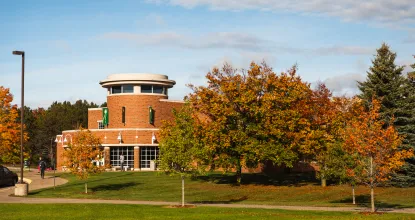
The NMU Hoop House is a three-season structure for growing food on the north edge of campus near the Jacobetti Complex. For more than 15 years the NMU Hoop House has welcomed NMU and Marquette community members to plant, water, weed, harvest, compost, learn, and enjoy getting one’s hands dirty. The EEGS Department oversees and maintains the Hoop House thanks to enthusiastic helpers and student workers. Throughout this past summer and fall, volunteers conscientiously showed up for their morning or evening shifts to tend to the plants. With their tremendous help watering and weeding, the crops thrived and the harvest was remarkable.
Maddy Humphrey (BS ‘21 Environmental Studies and Sustainability) launched the NMU Hoop House Student Organization as an outcome of her Freshman Fellowship project. The very active group lives on and is thriving. This fall semester the students held workshops for making kimchi, tomato sauce, and hot sauce after harvesting produce grown at the site. Each month the students planned a field trip to a local farm, including the MSU North Farm, Seeds and Spores, and Partridge Creek Farm. Senior Environmental Science major Mary Kelly has co-led the student org for several semesters. She reported that, “We have a new group of co-leaders ready to step up and carry on the Hoop House mission in Winter and Fall 2024. I couldn't be more proud of the work we've accomplished so far, and can't wait to see what this next group of leaders does moving forward.”
Since the start of the pandemic in 2020, members of the student organization have donated most of their produce to the NMU Food Pantry to provide free access to fresh, healthy vegetables, herbs, and edible flowers…with zero food miles traveled. Kelly remarked, “It was a great year for leafy greens (especially kale!), as well as bell and hot peppers. After a rough season last year, the tomatoes rebounded, allowing us to harvest 15 to 20 pounds for a few weeks straight.”
Biology–Botany major Jonas Trombetta co-leads the organization with Kelly. Throughout the summer Trombetta maintained the compost bins—filling, turning, and watering them regularly. The net result was many wheelbarrows full of organic-rich mulch for the garden beds in and outside the greenhouse structure. Red wiggler worms in the vermicomposting bin inside the hoop house help speed up the process of breaking down organic matter to produce nutrient-rich worm castings. Since the hoop house was established, students have championed composting at the Hoop House. Momentum is building to scale up the volume of fruit and vegetable scraps and coffee grounds that is composted right on campus. Community members are welcome to drop off appropriate materials year round at the outside composting bins.
Dr. Ryan Stock and Dr. Jelili Adebiyi have encouraged their students to partner with the NMU Hoop House community garden to help with projects and propose new initiatives. Thanks to collaborative efforts, the NMU Hoop House continues to expand our local food system, improve food security, and increase access to freshly picked, nutrient-rich produce.
